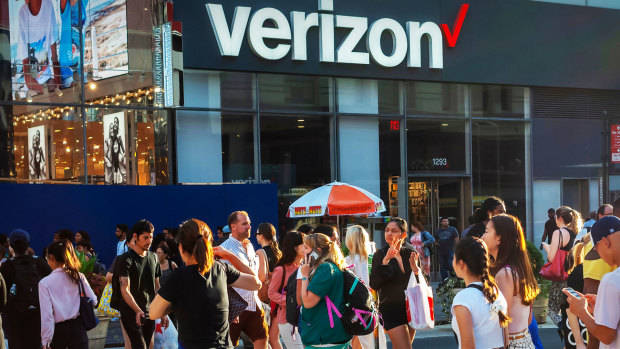
Shares of AT&T (T) -) and Verizon (VZ) -) have tumbled since July 9 (though they rebounded sharply Wednesday) amid concern over the news that their cables were wrapped in potentially dangerous lead.
That news was reported by The Wall Street Journal, which also said the companies have known of the problems for years. The cleanup costs, healthcare costs and legal liability could be huge for the telecommunications giants.
After the sharp declines of their share prices over the past year (33% for Verizon and 30% for AT&T), the stocks’ dividends may be their most attractive feature. AT&T has a forward dividend yield of 7.03%, while Verizon is at 7.09%. So you may be wondering if the cable brouhaha puts the dividends at risk.
Analysts emphasize that there’s no way of knowing yet what the financial cost of the situation will be for the companies.
Analyst’s Cost Estimates
But New Street Research analyst Jonathan Chaplin came up with estimates cited in Barron’s.
He factored in the percentage of cables that are dangerous and the cost of replacing them. The total cost comes to $60 billion, including $35 billion for AT&T and $8 billion for Verizon.
If AT&T borrowed $35 billion now, the extra debt might bring its total debt service expenditure to $8.3 billion a year, Chaplin says, according to Barron’s.
But Wall Street analysts estimate AT&T will generate $17 billion in free cash flow a year over the next three years. “If they can keep cash flows steady, they can do this without cutting the dividend,” he said
Looking at Verizon, a borrowing of $9 billion would put its annual debt service total at $4.2 billion. Forecasts call for free cash flow of almost $19 billion annually for the next three years. That would make the current dividend payment manageable.
Morningstar’s Contrarian Take
Morningstar analyst Michael Hodel isn’t as concerned about the cable conundrum as some others.
“While this situation warrants watching, we don’t expect the telecom industry will bear substantial legal liability,” he wrote in a commentary. “We believe AT&T and Verizon shares are very attractive at current prices.”
Hodel puts fair value for AT&T at $25. It traded Wednesday at $14.50. He puts fair value for Verizon at $57. It traded at $33.90 Wednesday.
“In more than two decades covering the telecom industry, we’ve never heard mention of an issue related to lead in cable sheathing,” he said.
“The Wall Street Journal cites a 2010 presentation to AT&T employees as proof that the firm has been aware of the issue, but that is not in dispute.
“Both the Centers for Diseases Control and National Institutes of Health web sites house research conducted in the 1990s around complaints from wire strippers that reported elevated blood lead levels, with steps to ensure worker safety.”
Other studies were conducted too. “Nothing suggests that telecom firms failed to follow proper procedures to protect employees when dealing with these cables, which were last deployed in the 1960s,” Hodel said.
“We also suspect that if lead from legacy telecom cables were a major threat, a government agency would have addressed it by now.”
The author of this story owns shares of Verizon.







